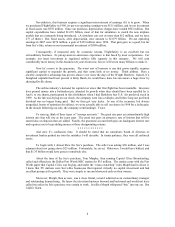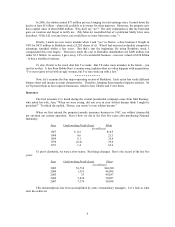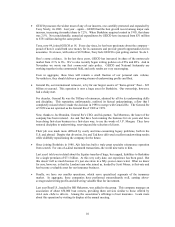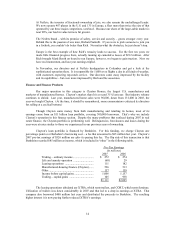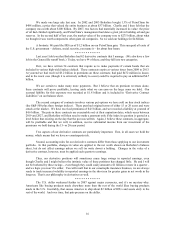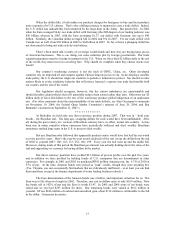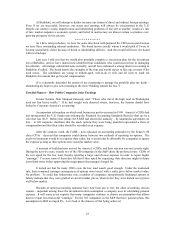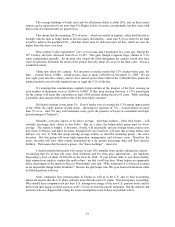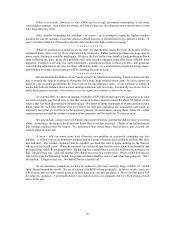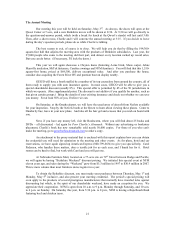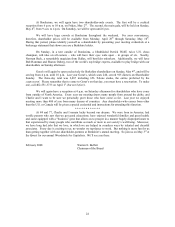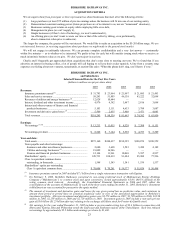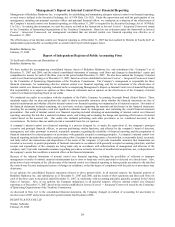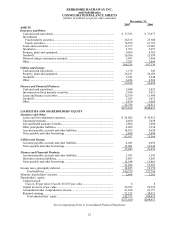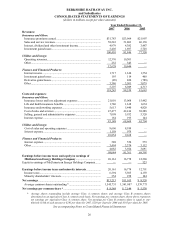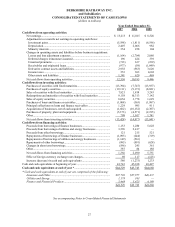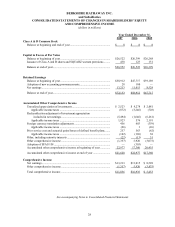Berkshire Hathaway 2007 Annual Report Download - page 19
Download and view the complete annual report
Please find page 19 of the 2007 Berkshire Hathaway annual report below. You can navigate through the pages in the report by either clicking on the pages listed below, or by using the keyword search tool below to find specific information within the annual report. At Berkshire, we will attempt to further increase our stream of direct and indirect foreign earnings.
Even if we are successful, however, our assets and earnings will always be concentrated in the U.S.
Despite our country’ s many imperfections and unrelenting problems of one sort or another, America’ s rule
of law, market-responsive economic system, and belief in meritocracy are almost certain to produce ever-
growing prosperity for its citizens.
* * * * * * * * * * * *
As I have told you before, we have for some time been well-prepared for CEO succession because
we have three outstanding internal candidates. The board knows exactly whom it would pick if I were to
become unavailable, either because of death or diminishing abilities. And that would still leave the board
with two backups.
Last year I told you that we would also promptly complete a succession plan for the investment
job at Berkshire, and we have indeed now identified four candidates who could succeed me in managing
investments. All manage substantial sums currently, and all have indicated a strong interest in coming to
Berkshire if called. The board knows the strengths of the four and would expect to hire one or more if the
need arises. The candidates are young to middle-aged, well-to-do to rich, and all wish to work for
Berkshire for reasons that go beyond compensation.
(I’ ve reluctantly discarded the notion of my continuing to manage the portfolio after my death –
abandoning my hope to give new meaning to the term “thinking outside the box.”)
Fanciful Figures – How Public Companies Juice Earnings
Former Senator Alan Simpson famously said: “Those who travel the high road in Washington
need not fear heavy traffic.” If he had sought truly deserted streets, however, the Senator should have
looked to Corporate America’ s accounting.
An important referendum on which road businesses prefer occurred in 1994. America’ s CEOs had
just strong-armed the U.S. Senate into ordering the Financial Accounting Standards Board to shut up, by a
vote that was 88-9. Before that rebuke the FASB had shown the audacity – by unanimous agreement, no
less – to tell corporate chieftains that the stock options they were being awarded represented a form of
compensation and that their value should be recorded as an expense.
After the senators voted, the FASB – now educated on accounting principles by the Senate’ s 88
closet CPAs – decreed that companies could choose between two methods of reporting on options. The
preferred treatment would be to expense their value, but it would also be allowable for companies to ignore
the expense as long as their options were issued at market value.
A moment of truth had now arrived for America’ s CEOs, and their reaction was not a pretty sight.
During the next six years, exactly two of the 500 companies in the S&P chose the preferred route. CEOs of
the rest opted for the low road, thereby ignoring a large and obvious expense in order to report higher
“earnings.” I’ m sure some of them also felt that if they opted for expensing, their directors might in future
years think twice before approving the mega-grants the managers longed for.
It turned out that for many CEOs even the low road wasn’ t good enough. Under the weakened
rule, there remained earnings consequences if options were issued with a strike price below market value.
No problem. To avoid that bothersome rule, a number of companies surreptitiously backdated options to
falsely indicate that they were granted at current market prices, when in fact they were dished out at prices
well below market.
Decades of option-accounting nonsense have now been put to rest, but other accounting choices
remain – important among these the investment-return assumption a company uses in calculating pension
expense. It will come as no surprise that many companies continue to choose an assumption that allows
them to report less-than-solid “earnings.” For the 363 companies in the S&P that have pension plans, this
assumption in 2006 averaged 8%. Let’ s look at the chances of that being achieved.
18


